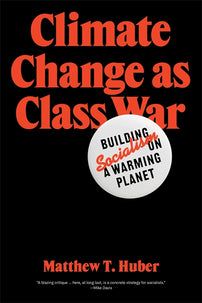The airline industry is dehumanizing
“Left unexamined is the true beneficiary of air travel and the true driver of emissions: the airline industry itself.” An excerpt from Climate Change as Class War.

Matthew T. Huber argues that the carbon-intensive capitalist class must be confronted with its disproportionate effect on the climate in Climate Change as Class War.
It is hard to argue that flying is a pleasurable experience. You are squeezed in every way imaginable: physically into your seat; financially in your bank account; and temporally through cancellations, overbookings, and delays. You become a disposable customer unit in a larger accumulation strategy. In 2017, security officials physically beat a passenger, Dr. David Dao, and dragged him off a United Airlines plane when he refused to give up a seat he had already paid for. The incident revealed the extent to which the industry will go to maintain the unfair practice of overbooking and expelling paid passengers from flights.
Dehumanizing passengers has paid off for the airline industry, which has seen sustained growth in profitability since the financial crisis of 2008. The decline of oil prices in 2014 only buoyed profits more. In 1978, the airline industry was deregulated. This led to more competition and lower prices in some cases, but also ushered in a period of profound volatility in the industry. Low-cost airlines like Southwest and JetBlue drove down prices; older, more established airlines merged or consolidated, like American buying up TWA and US Air, United merging with Continental, and Delta absorbing Northwest. In 2017, Delta CEO Ed Bastian earned $13 million, or 142 times more than the average Delta employee. The CEO and board of Delta likely generate most of their wealth from their stock in the company itself, as Delta enjoyed a near quintupling of its market capitalization from $7.67 billion in September 2012 to $38.46 billion in January 2020 before the Covid-19 pandemic. This is a company that doesn’t merely emit carbon for profit; it literally invested in an oil refinery in 2012.
The airline industry is a major contributor to global carbon emissions—estimates suggest about 2.5 percent. Air travel is essentially a commodity exchange between passengers and these oligopolistic corporations. It is hard to argue that the passengers are the main beneficiaries of this exchange. Yet, in carbon footprint accounting, the passengers are responsible for the emissions. This footprint ideology has led widespread anxiety among the professional classes over the need to “fly less.” Climate activists have sworn off air travel and committed to much longer travel times in order to attend important climate meetings, the most famous example being the teenage climate activist Greta Thunberg, who took a sailboat from Europe to New York City for the United Nations Climate Action Summit in September 2019.
This is particularly prevalent in my own academic profession, where travel to research sites, conferences, and workshops is a standard part of the job. Compared to industrial sectors like cement and fertilizer, higher education is relatively low carbon— most of its activities like writing, teaching, and research involve very few emissions. Indeed, Alyssa Battistoni argues that any low-carbon society would vastly widen access to higher education: “programs like universal health care and free college that simultaneously expand access to public goods and the scope of the low-carbon economy.” This has not stopped a movement among many in the academy to focus on the flying behavior of other academic professionals. Over 2,600 have signed an online petition organized by the “Flying Less” campaign that calls on universities and professional associations to “greatly reduce flying.” The campaign has a Frequently Asked Question section that lays out the centrality of flying to the menu of lifestyle changes academics should consider:
Many university-based academics fly many thousand[s] of miles per year, sufficient to make aviation their single biggest emissions source. We have faculty colleagues who diligently limit their environmental impact in many areas of their lives, but not their flying behavior. For an academic professional who eats comparatively little meat, commutes by public transportation, sets the home thermostat at a reasonable temperature, and drives a fuel-efficient car, unrestrained flying behavior easily may be responsible for a large fraction of his or her total climate change impact.
We are familiar with the logic that individuals have discrete “impacts” associated with the consumption of energy, food, and air travel. The entire political campaign directs its attention toward the consumers of air travel. Left unexamined is the true beneficiary of air travel and the true driver of emissions: the airline industry itself.
There is very little climate activism aimed at regulating or even expropriating this industry for its 2.5 percent contribution to emissions. Nevertheless, academics spend endless hours on trains and other modes of transport to make their already low-carbon jobs even more virtuously low carbon, and even more hours on social media villainizing those who fly as a means of academic survival. Meanwhile, as labor in higher education becomes more and more precarious, the most disadvantaged workers, like graduate students and adjuncts, need to fly to improve their chances in a brutally competitive market.
[book-strip index="1" style="buy"]
